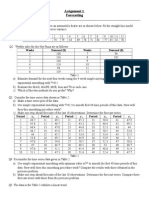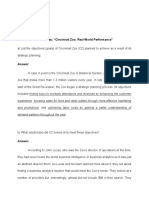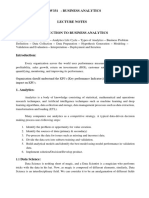Essential_Python_Libraries_For_Data_Science_1694045951
Uploaded by
sriroop23Essential_Python_Libraries_For_Data_Science_1694045951
Uploaded by
sriroop23#_ Essential Python Libraries Data science
1. 📊 Data Manipulation:
● Library: Pandas
● Importance: Provides data structures and tools for efficient data
manipulation, cleaning, and analysis.
● Resources:
○ Pandas
2. 📈 Data Visualization:
● Library: Matplotlib, Seaborn, Plotly
● Importance: Offers various plotting and visualization tools to
represent data in meaningful ways.
● Resources:
○ Matplotlib
○ Seaborn
○ Plotly
3. 📉 Statistical Analysis:
● Library: SciPy, Statsmodels
● Importance: Provides functions for various statistical
computations, hypothesis testing, and modeling.
● Resources:
○ SciPy
○ Statsmodels
4. 📊 Interactive Data Visualization:
● Library: Bokeh, Altair
● Importance: Enables creation of interactive, web-based
visualizations for exploration.
● Resources:
○ Bokeh
○ Altair
By: Waleed Mousa
5. 🧮 Data Cleaning and Preprocessing:
● Library: Scikit-learn
● Importance: Provides tools for data preprocessing, feature
extraction, and transformation.
● Resources:
○ Scikit-learn
6. 📊 Geospatial Data Analysis:
● Library: GeoPandas, Folium
● Importance: Specialized for working with geospatial data, maps,
and visualizations.
● Resources:
○ GeoPandas
○ Folium
7. 🧹 Data Cleaning and Wrangling:
● Library: Dask
● Importance: Enables parallel and distributed computing for
larger-than-memory datasets.
● Resources:
○ Dask
8. 📈 Time Series Analysis:
● Library: Pandas (Time Series), Prophet
● Importance: Specialized for analyzing and forecasting time series
data.
● Resources:
○ Pandas Time Series
○ Prophet
9. 🎛️ Feature Engineering:
● Library: Feature-engine
● Importance: Provides tools for feature engineering,
transformation, and preprocessing.
By: Waleed Mousa
● Resources:
○ Feature-engine
10. 📉 Dimensionality Reduction:
● Library: Scikit-learn (PCA, t-SNE)
● Importance: Reduces the number of features while retaining
relevant information.
● Resources:
○ Scikit-learn PCA
○ Scikit-learn t-SNE
11. 🧪 Hypothesis Testing and A/B Testing:
● Library: Scipy.stats
● Importance: Conducts various statistical tests to validate
hypotheses and analyze experiments.
● Resources:
○ Scipy.stats
12. 📊 Natural Language Processing (NLP):
● Library: NLTK, SpaCy
● Importance: Provides tools for text analysis, tokenization, and
language processing.
● Resources:
○ NLTK
○ SpaCy
13. 🤖 Machine Learning:
● Library: Scikit-learn, XGBoost, LightGBM, CatBoost
● Importance: Offers a range of machine learning algorithms and
models for classification, regression, and more.
● Resources:
○ XGBoost
○ LightGBM
○ CatBoost
By: Waleed Mousa
14. 📊 Big Data Analysis:
● Library: PySpark
● Importance: Enables distributed processing and analysis of large
datasets using Spark.
● Resources:
○ PySpark
15. 📉 Bayesian Data Analysis:
● Library: PyMC3
● Importance: Enables Bayesian statistical modeling and
probabilistic programming.
● Resources:
○ PyMC3
16. 📊 Data Profiling and Exploratory Data Analysis (EDA):
● Library: Pandas Profiling, SweetViz
● Importance: Generates comprehensive data analysis reports and
visualizations.
● Resources:
○ Pandas Profiling
○ SweetViz
17. 📈 Neural Networks and Deep Learning:
● Library: TensorFlow, Keras, PyTorch
● Importance: Provides tools for building and training deep neural
networks.
● Resources:
○ TensorFlow
○ Keras
○ PyTorch
By: Waleed Mousa
18. 🛢️ Database Integration:
● Library: SQLAlchemy, Pandas SQL
● Importance: Facilitates interaction with relational databases and
SQL querying.
● Resources:
○ SQLAlchemy
19. 🧠 Neural Architecture Search:
● Library: AutoKeras, Hyperopt
● Importance: Automates the search for optimal neural network
architectures and hyperparameters.
● Resources:
○ AutoKeras
○ Hyperopt
20. 🧬 Bioinformatics and Genomics:
● Library: Biopython
● Importance: Specialized for biological data analysis, sequence
alignment, and structure prediction.
● Resources:
○ Biopython
21. 📉 Time Series Forecasting:
● Library: Prophet, Statsmodels (Time Series)
● Importance: Focuses on modeling and forecasting time series data.
● Resources:
○ Prophet
○ Statsmodels Time Series
22. 📊 Data Visualization Dashboards:
● Library: Dash, Streamlit
● Importance: Enables creation of interactive web-based data
visualization applications.
● Resources:
By: Waleed Mousa
○ Dash
○ Streamlit
23. 🌐 Web Scraping and Data Collection:
● Library: Beautiful Soup, Scrapy
● Importance: Extracts data from websites and APIs for analysis.
● Resources:
○ Beautiful Soup
○ Scrapy
24. 📊 Data Annotation and Labeling:
● Library: LabelImg, RectLabel
● Importance: Provides tools for annotating and labeling data for
machine learning tasks.
● Resources:
○ LabelImg
○ RectLabel
25. 📈 Hyperparameter Tuning:
● Library: Optuna, Hyperopt
● Importance: Automates the search for optimal hyperparameters for
machine learning models.
● Resources:
○ Optuna
○ Hyperopt
26. 🚀 Deployment and Model Serving:
● Library: Flask, FastAPI
● Importance: Enables building APIs and web services for deploying
machine learning models.
● Resources:
○ Flask
○ FastAPI
27. 🎯 AutoML (Automated Machine Learning):
By: Waleed Mousa
● Library: H2O.ai, Auto-sklearn
● Importance: Automates the process of selecting algorithms and
hyperparameters for machine learning.
● Resources:
○ H2O.ai
○ Auto-sklearn
28. 🛠️ Data Version Control:
● Library: DVC (Data Version Control)
● Importance: Manages versions of datasets and data pipelines.
● Resources:
○ DVC (Data Version Control)
29. 📜 Text Analysis and Natural Language Processing (NLP):
● Library: Transformers (Hugging Face), Gensim
● Importance: Specialized for advanced NLP tasks, such as sentiment
analysis, text generation, and more.
● Resources:
○ Transformers (Hugging Face)
○ Gensim
30. 📊 Data Privacy and Ethics:
● Library: PySyft
● Importance: Focuses on privacy-preserving data analysis and
machine learning in collaborative environments.
● Resources:
○ PySyft
By: Waleed Mousa
You might also like
- Data Analysis With Python - FreeCodeCampNo ratings yetData Analysis With Python - FreeCodeCamp26 pages
- Mastering Python For Data Science With Numpy & Pandas100% (2)Mastering Python For Data Science With Numpy & Pandas136 pages
- Weekly Quiz 3 (AS) - PGPBABI.O.OCT19 Advanced Statistics - Great Learning PDF100% (2)Weekly Quiz 3 (AS) - PGPBABI.O.OCT19 Advanced Statistics - Great Learning PDF6 pages
- Question 1A: FOR ETF5910 ONLY (10 Marks)No ratings yetQuestion 1A: FOR ETF5910 ONLY (10 Marks)4 pages
- Interview Preparation For Data ScientistsNo ratings yetInterview Preparation For Data Scientists5 pages
- Becoming A Data Engineer (The StudyPlan)No ratings yetBecoming A Data Engineer (The StudyPlan)4 pages
- Seshat's Global OSINT Paradigm - A Comprehensive FrameworkNo ratings yetSeshat's Global OSINT Paradigm - A Comprehensive Framework8 pages
- ML_Engineer_Roadmap_2024_Abdullah_Al_Mamun (1)No ratings yetML_Engineer_Roadmap_2024_Abdullah_Al_Mamun (1)6 pages
- Interview Preparation For DevOps EngineersNo ratings yetInterview Preparation For DevOps Engineers4 pages
- Personalized Learning Path Generator (PLPG)No ratings yetPersonalized Learning Path Generator (PLPG)3 pages
- Data Scientist Nanodegree Syllabus: Before You StartNo ratings yetData Scientist Nanodegree Syllabus: Before You Start5 pages
- a structured learning guide for becoming a Data ScientistNo ratings yeta structured learning guide for becoming a Data Scientist9 pages
- 5-Week Data Science Bootcamp Detailed SyllabusNo ratings yet5-Week Data Science Bootcamp Detailed Syllabus4 pages
- Data Mining With Rattle For: Akhil Anil Karun Full Stack Engineer (Java)No ratings yetData Mining With Rattle For: Akhil Anil Karun Full Stack Engineer (Java)40 pages
- Data Analysis With Python - FreeCodeCamp PDFNo ratings yetData Analysis With Python - FreeCodeCamp PDF28 pages
- Data Analysis With Python: Full Tutorial For BeginnersNo ratings yetData Analysis With Python: Full Tutorial For Beginners26 pages
- 5 must-have Python projects for all Data Scientists (1)No ratings yet5 must-have Python projects for all Data Scientists (1)2 pages
- A - V.02 the Ultimate Roadmap to Becoming a Data Analyst Without Spending Money (for 9-To-5 Job Holders)No ratings yetA - V.02 the Ultimate Roadmap to Becoming a Data Analyst Without Spending Money (for 9-To-5 Job Holders)5 pages
- Data Analysis With Python - FreeCodeCampNo ratings yetData Analysis With Python - FreeCodeCamp28 pages
- 2021 Tools ML DL Dan Cheat Sheets For AINo ratings yet2021 Tools ML DL Dan Cheat Sheets For AI25 pages
- Softwares For Data Analysis and ManagementNo ratings yetSoftwares For Data Analysis and Management1 page
- Data Analytics and Reporting - Notes Unit 1 and 2No ratings yetData Analytics and Reporting - Notes Unit 1 and 211 pages
- Becoming a Professional Power BI Developer RoadMap 1731972136No ratings yetBecoming a Professional Power BI Developer RoadMap 17319721367 pages
- Unleashing the Power of Data: Innovative Data Mining with PythonFrom EverandUnleashing the Power of Data: Innovative Data Mining with PythonNo ratings yet
- Correlation Coefficient in Power BI Using DAX - Ben's BlogNo ratings yetCorrelation Coefficient in Power BI Using DAX - Ben's Blog10 pages
- 6 Business Intelligence Business Analytics VisualizationNo ratings yet6 Business Intelligence Business Analytics Visualization17 pages
- Mathematics Anxiety Separating The Math From The AnxietyNo ratings yetMathematics Anxiety Separating The Math From The Anxiety9 pages
- DBU Thesis, Research, Research Proposal Guideline100% (1)DBU Thesis, Research, Research Proposal Guideline62 pages
- 7AG518 International Finance-CW1 Brief 2018.19No ratings yet7AG518 International Finance-CW1 Brief 2018.194 pages
- CHAPTER 3: Big Data Adoption and Planning ConsiderationsNo ratings yetCHAPTER 3: Big Data Adoption and Planning Considerations23 pages
- Enclosure 2-Expanded Appraising Guide For Basic Research ProposalsNo ratings yetEnclosure 2-Expanded Appraising Guide For Basic Research Proposals5 pages
- Pengujian Pertumbuhan Produksi Maggot Melalui Kombinasi Sampah Rumah Tangga Dan Daun Kering Menggunakan Rancangan Acak LengkapNo ratings yetPengujian Pertumbuhan Produksi Maggot Melalui Kombinasi Sampah Rumah Tangga Dan Daun Kering Menggunakan Rancangan Acak Lengkap10 pages
- Template For Preparing Article For Journal of Contemporary Information Technology, Management, and Accounting 16pt, Times New Roman, BoldNo ratings yetTemplate For Preparing Article For Journal of Contemporary Information Technology, Management, and Accounting 16pt, Times New Roman, Bold4 pages
- Report On The Utility of A North Carolina Jail Database: Duke University Bass Connections Team, 2020-2021No ratings yetReport On The Utility of A North Carolina Jail Database: Duke University Bass Connections Team, 2020-202136 pages
- Case Study IBM - The Case For Business Analytics in Midsize FirmNo ratings yetCase Study IBM - The Case For Business Analytics in Midsize Firm14 pages
- A Review Paperbased On Big Data Analytics: RashmiNo ratings yetA Review Paperbased On Big Data Analytics: Rashmi7 pages
- AnalytixLabs - Business Analytics 360-1648535324057No ratings yetAnalytixLabs - Business Analytics 360-164853532405723 pages
- Introductory Statistics (STA101) Memo Class TestNo ratings yetIntroductory Statistics (STA101) Memo Class Test3 pages
- Mastering Python For Data Science With Numpy & PandasMastering Python For Data Science With Numpy & Pandas
- Weekly Quiz 3 (AS) - PGPBABI.O.OCT19 Advanced Statistics - Great Learning PDFWeekly Quiz 3 (AS) - PGPBABI.O.OCT19 Advanced Statistics - Great Learning PDF
- Seshat's Global OSINT Paradigm - A Comprehensive FrameworkSeshat's Global OSINT Paradigm - A Comprehensive Framework
- Data Scientist Nanodegree Syllabus: Before You StartData Scientist Nanodegree Syllabus: Before You Start
- a structured learning guide for becoming a Data Scientista structured learning guide for becoming a Data Scientist
- Data Mining With Rattle For: Akhil Anil Karun Full Stack Engineer (Java)Data Mining With Rattle For: Akhil Anil Karun Full Stack Engineer (Java)
- Data Analysis With Python: Full Tutorial For BeginnersData Analysis With Python: Full Tutorial For Beginners
- 5 must-have Python projects for all Data Scientists (1)5 must-have Python projects for all Data Scientists (1)
- A - V.02 the Ultimate Roadmap to Becoming a Data Analyst Without Spending Money (for 9-To-5 Job Holders)A - V.02 the Ultimate Roadmap to Becoming a Data Analyst Without Spending Money (for 9-To-5 Job Holders)
- Becoming a Professional Power BI Developer RoadMap 1731972136Becoming a Professional Power BI Developer RoadMap 1731972136
- Unleashing the Power of Data: Innovative Data Mining with PythonFrom EverandUnleashing the Power of Data: Innovative Data Mining with Python
- Correlation Coefficient in Power BI Using DAX - Ben's BlogCorrelation Coefficient in Power BI Using DAX - Ben's Blog
- 6 Business Intelligence Business Analytics Visualization6 Business Intelligence Business Analytics Visualization
- Mathematics Anxiety Separating The Math From The AnxietyMathematics Anxiety Separating The Math From The Anxiety
- CHAPTER 3: Big Data Adoption and Planning ConsiderationsCHAPTER 3: Big Data Adoption and Planning Considerations
- Enclosure 2-Expanded Appraising Guide For Basic Research ProposalsEnclosure 2-Expanded Appraising Guide For Basic Research Proposals
- Pengujian Pertumbuhan Produksi Maggot Melalui Kombinasi Sampah Rumah Tangga Dan Daun Kering Menggunakan Rancangan Acak LengkapPengujian Pertumbuhan Produksi Maggot Melalui Kombinasi Sampah Rumah Tangga Dan Daun Kering Menggunakan Rancangan Acak Lengkap
- Template For Preparing Article For Journal of Contemporary Information Technology, Management, and Accounting 16pt, Times New Roman, BoldTemplate For Preparing Article For Journal of Contemporary Information Technology, Management, and Accounting 16pt, Times New Roman, Bold
- Report On The Utility of A North Carolina Jail Database: Duke University Bass Connections Team, 2020-2021Report On The Utility of A North Carolina Jail Database: Duke University Bass Connections Team, 2020-2021
- Case Study IBM - The Case For Business Analytics in Midsize FirmCase Study IBM - The Case For Business Analytics in Midsize Firm
- AnalytixLabs - Business Analytics 360-1648535324057AnalytixLabs - Business Analytics 360-1648535324057

























































































